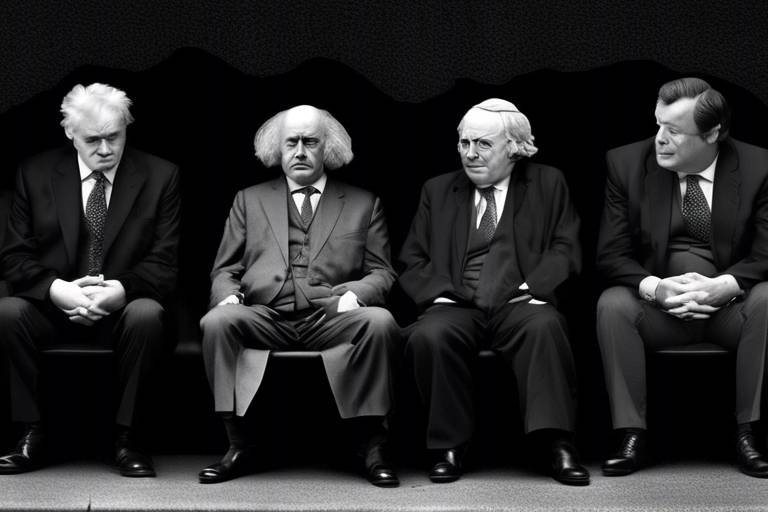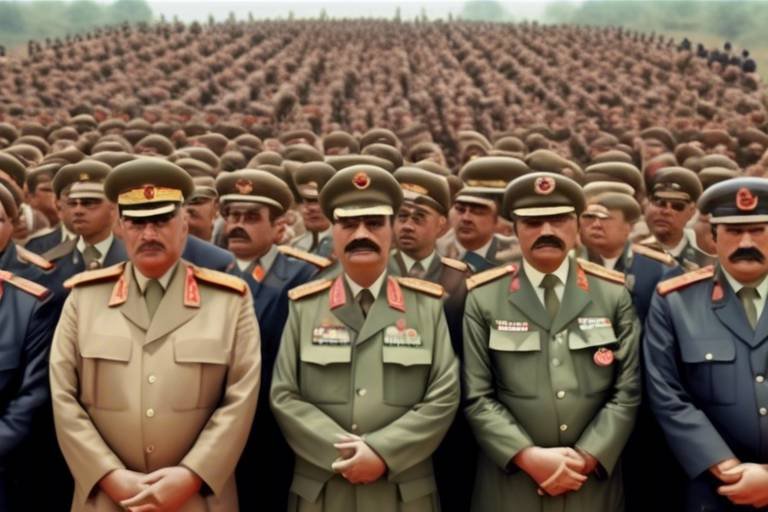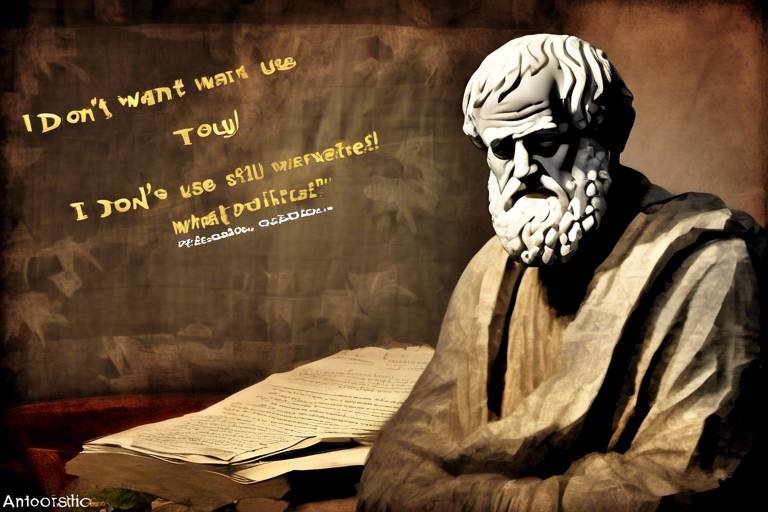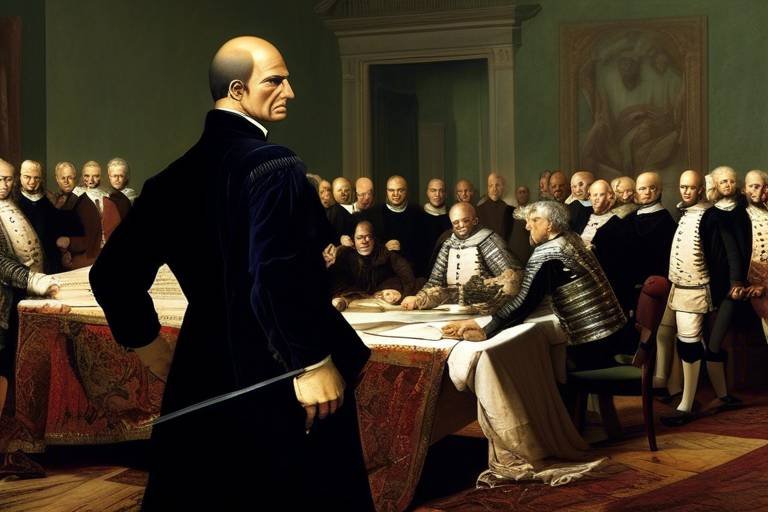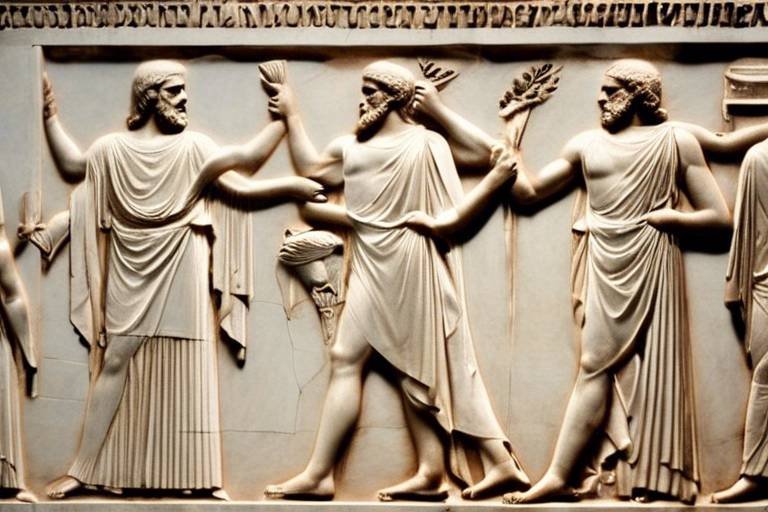Does Philosophy Influence Politics More Than Wealth?
In the intricate tapestry of politics, the threads of philosophy and wealth weave together to create a complex narrative that shapes governance and policy-making. But the question remains: does one thread hold more power than the other? As we delve into this topic, we will explore how philosophical ideologies have historically laid the groundwork for political systems, often providing a moral compass that guides leaders and citizens alike. At the same time, we cannot ignore the undeniable influence that wealth exerts on political dynamics, enabling those with financial resources to sway decisions and outcomes. This article aims to dissect the interplay between these two forces, examining whether the ideals of philosophy truly surpass the clout of financial power in shaping our political landscape.
Philosophy has been the bedrock of political ideologies, offering frameworks that define governance. From the ancient musings of Plato to the modern theories of John Rawls, philosophical principles have informed political theories and practices. These principles help shape leaders' and citizens' understanding of concepts such as justice, authority, and freedom. For instance, when we consider the notion of justice, philosophical debates help us explore what it means to create a fair society. This exploration is not merely academic; it has real-world implications, influencing how laws are crafted and how societies function. As we analyze various political systems, we can see how philosophies like liberalism, conservatism, and socialism each offer unique perspectives that impact policy decisions and societal norms.
On the flip side, wealth has long been a formidable player in the political arena. Financial resources can be leveraged to exert influence over political decisions, campaigns, and legislation. This ability often overshadows philosophical considerations, leading to a political landscape where money talks louder than ideals. For example, wealthy individuals and corporations can fund political campaigns, effectively shaping electoral outcomes. This raises critical questions about the integrity of democratic processes and whether philosophical discourse can survive in an environment dominated by financial interests.
Throughout history, we can identify pivotal moments where wealth dictated political power dynamics. Consider the age of feudalism, where landownership directly correlated with political influence. Wealthy landowners wielded significant power, often overriding philosophical ideals of equality and justice. Similarly, the rise of industrial capitalism saw a concentration of wealth that allowed a select few to dictate political agendas. These historical examples highlight the ongoing tension between the ideals of philosophy and the reality of wealth in shaping political outcomes.
In modern politics, campaign financing plays a critical role. Wealthy donors and corporations often shape electoral outcomes, leading to a political environment where the voices of the affluent overshadow those of the average citizen. This phenomenon raises significant concerns about the integrity of democratic processes. Are we truly living in a democracy when financial power can dictate political narratives? The potential marginalization of philosophical discourse in favor of financial gain is a pressing issue that warrants our attention.
Economic disparities can lead to unequal political representation, creating a system where the wealthy have a disproportionate influence on policy priorities. This wealth inequality affects not only voter influence but also the overall health of democratic institutions. When the voices of the affluent drown out the concerns of the less fortunate, philosophical arguments for equity and justice often take a backseat. This dynamic prompts us to ask: how can we ensure that philosophical ideals are not sidelined in favor of financial interests?
Different political systems are rooted in various philosophical ideologies, each shaping governance in unique ways. For example, liberalism emphasizes individual rights and freedoms, while socialism advocates for collective ownership and social welfare. These philosophical foundations significantly impact policies on social justice, individual rights, and economic management. Understanding these ideologies allows us to appreciate how philosophy can influence political systems, often leading to reforms that align with ethical considerations.
While philosophy and wealth can influence politics separately, their interaction is complex. Philosophical beliefs can moderate the effects of wealth, fostering a more equitable approach to governance. When leaders prioritize philosophical ideals over financial gain, they create a political climate that values ethical considerations. This interplay is crucial for ensuring that political systems remain responsive to the needs of all citizens, not just the wealthy few.
Examining specific case studies reveals how philosophical movements have shaped political landscapes. For instance, the civil rights movement in the United States was heavily influenced by philosophical principles of equality and justice. Activists drew upon these ideals to challenge systemic injustices, leading to significant political reforms. Such instances demonstrate the enduring impact of philosophical thought on governance, highlighting its potential to drive meaningful change.
Despite their influence, philosophical ideals often face challenges from wealth-driven interests. Lobbying, corruption, and the prioritization of financial gain over ethical considerations are significant obstacles that philosophical perspectives encounter in political arenas. These challenges underscore the need for vigilance in protecting philosophical discourse within politics, ensuring that it remains a vital force for good.
- How does philosophy influence political decision-making? Philosophy provides a framework for understanding justice, authority, and ethics, guiding leaders in their decision-making processes.
- Can wealth overshadow philosophical ideals in politics? Yes, financial resources can significantly influence political outcomes, often sidelining philosophical discourse.
- What are some historical examples of wealth influencing politics? Throughout history, wealthy landowners and industrialists have shaped political power dynamics, often overriding philosophical ideals.
- How can philosophical ideals be protected in a wealth-driven political landscape? Advocacy for transparency and accountability in political financing can help protect philosophical discourse from being overshadowed by financial interests.

The Role of Philosophy in Political Thought
Philosophy has been the backbone of political ideologies for centuries, serving as a guiding light that shapes how societies govern themselves. At its core, philosophy provides the frameworks through which we understand concepts such as justice, authority, and the role of the individual within the state. Think of it as the blueprint for a building; without a solid design, the structure may crumble. In political thought, philosophical principles offer insights that help leaders and citizens alike navigate the complexities of governance.
One of the most profound impacts of philosophy on politics is its ability to define what is considered 'just' or 'fair.' For instance, the works of philosophers like John Locke and Jean-Jacques Rousseau laid the groundwork for modern democratic thought. Locke's ideas about natural rights and the social contract have influenced countless political systems, emphasizing the importance of individual liberties and governmental accountability. On the other hand, Rousseau's focus on the general will challenges us to think about collective decision-making and the common good, urging societies to prioritize the needs of the many over the desires of the few.
Moreover, philosophical ideologies often serve as a rallying point for movements seeking change. For example, the principles of liberty and equality espoused by Enlightenment thinkers inspired revolutions and reforms across the globe, demonstrating how powerful ideas can mobilize people toward a shared vision. This is where the interplay between philosophy and politics becomes particularly fascinating—philosophical ideas can ignite passion and drive political action, leading to significant societal transformations.
To illustrate the role of philosophy in political thought, consider the following table that summarizes key philosophical influences on political ideologies:
| Philosopher | Key Ideas | Influence on Political Thought |
|---|---|---|
| John Locke | Natural rights, social contract | Foundation of liberal democracy |
| Jean-Jacques Rousseau | General will, collective good | Inspiration for democratic movements |
| Karl Marx | Class struggle, economic determinism | Foundation for socialist ideologies |
| Friedrich Nietzsche | Will to power, critique of morality | Influence on existentialist and postmodern thought |
In summary, the role of philosophy in political thought is not merely academic; it shapes our understanding of governance, influences leaders, and impacts citizens' perceptions of justice and authority. As we navigate the complexities of modern politics, reflecting on these philosophical foundations can provide clarity and direction. After all, in a world increasingly driven by financial interests, it is the philosophical discourse that can remind us of the values that truly matter.

Wealth as a Political Tool
Wealth has long been a significant factor in the political arena, acting as a powerful tool that can shape outcomes, sway opinions, and influence governance. Think about it: money talks, right? In politics, this saying rings especially true. Financial resources can provide access to platforms, amplify voices, and even dictate the narrative. This section delves into the multifaceted role that wealth plays in politics, examining how it can often overshadow philosophical considerations.
At its core, wealth enables individuals and organizations to exert considerable influence over political processes. From funding campaigns to lobbying for specific policies, the financial backing can create a landscape where decisions are made not solely based on ethical considerations or philosophical ideologies, but rather on what the highest bidder wants. It’s like a game where the richest players hold the most cards, and the stakes are the very fabric of our society.
Consider the following ways in which wealth manifests as a political tool:
- Campaign Financing: In modern democracies, the significance of campaign financing cannot be overstated. Wealthy donors and corporations can pour millions into electoral campaigns, effectively buying influence and shaping the political landscape. This raises critical questions about the integrity of our democratic processes.
- Lobbying Efforts: Corporations and interest groups often employ lobbyists to advocate for their agendas. These lobbyists, armed with financial resources, can sway lawmakers and create policies that align with the interests of a select few, rather than the general populace.
- Media Influence: Wealth also allows for substantial control over media narratives. Those with financial power can fund media outlets or campaigns that promote their viewpoints, effectively drowning out alternative perspectives and philosophical discussions.
As we explore the intricate relationship between wealth and politics, it’s essential to acknowledge the historical context that has shaped this dynamic. Throughout history, there have been numerous instances where financial resources have determined political outcomes. For example, during the Gilded Age in the United States, the immense wealth of industrialists directly influenced legislation and government policies, often at the expense of the working class. This era serves as a stark reminder of how wealth can overshadow the philosophical ideals of equality and justice.
Moreover, the influence of money in elections raises serious concerns about the health of democratic institutions. When the voices of a few wealthy individuals drown out the majority, it creates an imbalance that undermines the very principles of democracy. This phenomenon is not just a theoretical concern; it has real-world implications that can lead to disenfranchisement and apathy among the electorate. When people feel that their votes don’t matter because they are overshadowed by financial power, it can lead to a significant decline in civic engagement.
In conclusion, while wealth undoubtedly serves as a potent political tool, its influence often comes at a cost. The philosophical discussions surrounding equity, justice, and representation can become secondary to the financial interests of a select few. As we navigate this complex landscape, it becomes increasingly important to advocate for a political system that values philosophical discourse and prioritizes the voices of all citizens, not just those with the deepest pockets.
- How does wealth influence political campaigns?
Wealthy individuals and corporations can significantly impact political campaigns by providing substantial funding, which can lead to increased visibility and influence over political narratives. - What are the implications of wealth-driven politics?
Wealth-driven politics can lead to unequal representation, where the interests of the wealthy overshadow the needs and voices of the general populace, undermining democratic principles. - Can philosophical ideals survive in a wealth-driven political environment?
While challenging, philosophical ideals can still influence politics, especially when citizens advocate for equity and justice, pushing back against the dominance of financial interests.

Historical Perspectives on Wealth and Power
The relationship between wealth and power has been a defining feature of human civilization, shaping political landscapes throughout history. From ancient empires to modern democracies, financial resources have often dictated who holds authority and how that power is wielded. For instance, consider the Roman Empire, where wealth was concentrated among the elite, allowing them to influence political decisions and maintain control over the populace. The Senate was primarily composed of wealthy landowners, whose economic status directly impacted their political clout. This historical precedent illustrates how financial power can overshadow philosophical or ethical considerations in governance.
Furthermore, the rise of capitalism in the 18th and 19th centuries marked a significant shift in the dynamics of wealth and power. As industrialization took hold, new wealthy classes emerged, challenging the traditional aristocracy. This transition not only altered the social structure but also redefined political power. Wealth became a vehicle for influence, as industrialists and capitalists began to shape policies that favored their interests. The Gilded Age in the United States serves as a prime example, where the concentration of wealth among a few led to significant political corruption and the prioritization of economic gain over public welfare.
In examining these historical contexts, it becomes evident that wealth does not merely serve as a tool for political influence; it can also create a feedback loop that perpetuates inequality. For instance, as wealthy individuals and corporations fund political campaigns, they gain access to lawmakers, who may feel beholden to their financial backers rather than their constituents. This dynamic raises critical questions about the integrity of democratic processes and the extent to which philosophical ideals of equality and justice can survive in such an environment.
To illustrate this further, let's look at a few key historical moments where wealth directly influenced political outcomes:
| Event | Wealth Influence | Outcome |
|---|---|---|
| Fall of the Roman Republic | Wealthy generals like Julius Caesar leveraged their financial resources to gain political power. | Transition to autocracy with the rise of emperors. |
| American Gilded Age | Industrialists used their fortunes to influence elections and policy. | Increased corruption and inequality, leading to reforms. |
| Russian Revolution | Wealthy elites were overthrown, but the new regime also relied on economic power. | Establishment of a communist state with its own power dynamics. |
As we reflect on these examples, it becomes clear that wealth has historically been a formidable force in shaping political realities. While philosophical ideals strive for justice and equality, the practicalities of wealth often create a complex interplay that can undermine those very principles. The challenge remains: how can societies reconcile these competing forces to foster a political environment where philosophical discourse can thrive?
- How has wealth historically influenced political systems? Wealth has often allowed individuals and groups to exert significant influence over political decisions, overshadowing philosophical considerations.
- What are some historical examples of wealth affecting politics? Key examples include the Roman Empire, the American Gilded Age, and the Russian Revolution.
- Can philosophy coexist with wealth in politics? While they can coexist, the influence of wealth often challenges the implementation of philosophical ideals such as justice and equality.

The Influence of Money in Elections
In the realm of modern politics, the influence of money in elections cannot be overstated. Campaign financing has transformed the electoral landscape, often overshadowing the voices of ordinary citizens. Wealthy donors and corporations have the power to shape political outcomes, creating an environment where financial resources can dictate the direction of democratic processes. This raises important questions about the integrity of our electoral systems and the extent to which philosophical discourse is integrated into political decision-making.
When we examine the dynamics of campaign financing, it becomes apparent that money serves as a powerful tool in the hands of those who possess it. Candidates who can secure substantial financial backing are often able to mount more effective campaigns, utilizing resources for advertising, outreach, and mobilization efforts. This can create a significant disparity between candidates, where those with less financial support struggle to compete. Is it fair that political success hinges more on wealth than on ideas or integrity? This is a critical question that challenges the very foundation of democratic representation.
Moreover, the role of Political Action Committees (PACs) and Super PACs has further complicated the influence of money in elections. These entities can raise and spend unlimited amounts of money, often with minimal transparency regarding their donors. This lack of transparency can lead to a situation where the interests of a few wealthy individuals or corporations overshadow the needs and concerns of the general populace. In fact, studies have shown that candidates who receive substantial donations from these sources tend to prioritize the interests of their donors over those of their constituents.
To illustrate the extent of this influence, consider the following table that highlights the disparity in campaign contributions:
| Candidate | Total Contributions | Source of Contributions |
|---|---|---|
| Candidate A | $5 million | Corporations and PACs |
| Candidate B | $1 million | Individual donations |
| Candidate C | $500,000 | Grassroots fundraising |
This table demonstrates a stark contrast in fundraising abilities, which can directly influence the candidates' visibility and viability in elections. As we can see, Candidate A, with a whopping $5 million in contributions, is likely to have a significant advantage over Candidates B and C, who rely on more modest funding sources. This not only highlights the power of wealth in elections but also raises concerns about who truly represents the electorate.
In conclusion, the influence of money in elections is a pressing issue that cannot be ignored. It poses a challenge to the democratic ideals of equality and representation, often leading to a political landscape where financial power trumps philosophical ideals. As citizens, we must remain vigilant and advocate for reforms that promote transparency and equitable representation, ensuring that our political systems reflect the diverse voices of all individuals, not just the wealthy few.
- How does money impact election outcomes?
Money can significantly affect election outcomes by enabling candidates to run more effective campaigns, reach a wider audience, and influence voter perceptions through advertising and outreach efforts. - What are PACs and Super PACs?
PACs (Political Action Committees) and Super PACs are organizations that collect and distribute funds for political campaigns. Super PACs can raise unlimited amounts of money but must operate independently of the candidates they support. - Are there any reforms to limit the influence of money in politics?
Yes, various reforms have been proposed, including stricter campaign finance laws, increased transparency requirements for donations, and public financing of campaigns to level the playing field.

Wealth Inequality and Political Representation
Wealth inequality is not just a matter of economics; it has profound implications for political representation and the overall health of democratic institutions. When a small percentage of the population holds a disproportionate amount of wealth, the voices of the majority are often drowned out. This creates a scenario where policies and legislation are skewed in favor of the wealthy, leaving the needs and concerns of the average citizen unaddressed. But how does this actually play out in the political arena?
To understand the impact of wealth inequality on political representation, consider how economic disparities can lead to unequal influence in the political process. Wealthy individuals and corporations have the resources to fund campaigns, lobby for favorable legislation, and even sway public opinion through media ownership. As a result, the political landscape can become heavily biased towards the interests of the affluent, often at the expense of marginalized communities.
For instance, during elections, candidates who can secure substantial funding from wealthy donors tend to have a significant advantage. This financial backing enables them to amplify their messages, reach broader audiences, and ultimately increase their chances of winning. Consequently, the priorities of these candidates may shift towards the interests of their donors rather than the constituents they are meant to represent. This raises a crucial question: Are we truly living in a democracy when the voices of the wealthy overshadow those of the majority?
Moreover, wealth inequality can lead to a cycle of political disengagement among lower-income individuals. When citizens perceive that their votes carry less weight compared to those of the wealthy, they may feel disillusioned and choose not to participate in the electoral process. This disengagement further exacerbates the imbalance in representation, creating a vicious cycle where the interests of the wealthy continue to dominate political discourse.
In light of these challenges, it is essential to explore potential solutions that can mitigate the effects of wealth inequality on political representation. Some possible strategies include:
- Implementing campaign finance reform to limit the influence of money in politics.
- Encouraging grassroots movements that amplify the voices of underrepresented groups.
- Promoting policies that address systemic inequalities, ensuring that all citizens have equal access to political participation.
Ultimately, addressing wealth inequality is not merely an economic issue; it is a matter of ensuring that every citizen has a fair chance to be heard in the political arena. As we continue to grapple with these challenges, it is crucial to recognize that a healthy democracy thrives when all voices are valued equally, regardless of their economic status.
- How does wealth inequality affect voter turnout? Wealth inequality can lead to disillusionment among lower-income voters, causing them to feel that their votes do not matter, which can reduce voter turnout.
- What are some examples of campaign finance reform? Campaign finance reform can include measures like limiting individual contributions to candidates, increasing transparency in donations, and providing public funding for campaigns.
- Can grassroots movements really make a difference? Yes! Grassroots movements can mobilize communities, raise awareness about important issues, and challenge the status quo, leading to meaningful political change.

Philosophical Ideologies in Governance
When we delve into the realm of governance, it's impossible to ignore the profound impact that philosophical ideologies have on political systems. These ideologies serve as the backbone of political thought, shaping everything from policies to the way leaders interact with their constituents. For instance, consider the principles of liberalism, which emphasizes individual rights and freedoms. This philosophy advocates for a government that protects personal liberties, often leading to policies that promote social justice and equality. On the flip side, we have conservatism, which tends to prioritize tradition and stability. Here, governance is often about maintaining established norms and resisting rapid change, which can sometimes conflict with the ideals of progressivism.
Moreover, socialism presents an entirely different approach, focusing on collective ownership and the distribution of resources. This ideology argues for a government that actively works to reduce economic disparities and ensure that all citizens have access to basic needs. The interplay between these philosophical frameworks not only influences political agendas but also affects how citizens perceive their roles within society. Are they merely subjects of the state, or are they active participants in shaping its future?
To illustrate this further, we can look at how these ideologies manifest in various governance styles around the world. For example, Scandinavian countries often embody a blend of liberal and socialist ideals, promoting a welfare state that ensures a high standard of living for all. In contrast, more conservative regimes might focus on business interests, often at the expense of social programs. This divergence raises critical questions: How do we balance individual freedoms with collective responsibilities? And to what extent should a government intervene in the lives of its citizens?
It's also worth noting that philosophical ideologies are not static; they evolve over time, influenced by cultural shifts, economic changes, and even technological advancements. As societies grapple with issues like climate change, migration, and technological disruption, the philosophical underpinnings of governance will likely be challenged and redefined. This dynamic landscape makes it essential for both leaders and citizens to engage with these ideas critically and thoughtfully.
In summary, the influence of philosophical ideologies in governance is profound and multifaceted. They shape not only the policies that govern our lives but also the very fabric of our society. Understanding these ideologies helps us navigate the complex political landscape, fostering a more informed and engaged citizenry.

The Interplay Between Wealth and Philosophy
The relationship between wealth and philosophy in politics is a fascinating dance, where each influences the other in profound ways. Imagine a grand ballroom where the elegant waltz of philosophical ideals meets the vigorous tango of financial power. While they can operate independently, their interaction often creates a complex tapestry that shapes governance and policy-making. Philosophical beliefs can serve as a guiding light, illuminating paths toward equity and justice, while wealth can act as a powerful engine, driving political agendas and decisions.
At its core, this interplay raises critical questions: Can philosophical ideals survive when confronted with the overwhelming force of financial influence? Or does wealth merely serve as a tool to amplify certain philosophical narratives? For instance, consider how the philosophy of liberalism promotes individual freedoms and rights. In theory, this ideology champions the idea that every individual should have equal access to opportunities. However, when wealth becomes concentrated in the hands of a few, it can distort these ideals, leading to a society where only those with financial resources can truly exercise their rights. This creates a paradox—the more wealth one accumulates, the less the philosophical ideal of equality is realized.
Moreover, the interaction between wealth and philosophy can be seen in various political movements throughout history. For example, the rise of socialism was, in part, a response to the glaring inequalities created by unchecked capitalism. Philosophers like Karl Marx critiqued the capitalist system for prioritizing profit over people, advocating for a society where wealth is distributed more equitably. However, the implementation of these philosophical ideas often faced significant hurdles, primarily due to the financial interests of those in power, who wielded their wealth to resist change.
In contemporary politics, we observe similar dynamics at play. Wealthy donors and corporations often fund political campaigns, effectively shaping the narratives that dominate public discourse. This financial backing can drown out philosophical discussions that advocate for social justice, environmental sustainability, or ethical governance. The result? A political landscape where money can overshadow morality, leaving philosophical ideals struggling to find a voice amidst the clamor of financial interests.
To illustrate this interplay, let's take a look at a table that outlines how various philosophical ideologies can either be supported or undermined by financial power:
| Philosophical Ideology | Potential Support from Wealth | Potential Undermining by Wealth |
|---|---|---|
| Liberalism | Funding for education and social programs | Wealth concentration leads to unequal access to opportunities |
| Socialism | Support for redistributive policies | Resistance from wealthy elites protecting their interests |
| Conservatism | Funding for traditional values and institutions | Wealth can lead to cronyism and corruption |
This table highlights the dual nature of wealth in political contexts. It can both bolster and challenge philosophical ideologies, creating a dynamic where the two forces are in constant negotiation. Ultimately, the interplay between wealth and philosophy shapes not just political outcomes, but also the very fabric of our societies. As we navigate this complex landscape, it becomes essential to advocate for a balance—one where philosophical ideals can thrive alongside financial power, leading to a more just and equitable world.
- How does wealth influence political decision-making? Wealth can provide individuals and groups with the resources to lobby for specific policies, fund campaigns, and sway public opinion, often overshadowing philosophical discussions.
- Can philosophical ideals survive in a wealth-driven political landscape? Yes, but they often face significant challenges. Advocacy for equity and justice is crucial to ensure that philosophical ideals are not drowned out by financial interests.
- What role do philosophical movements play in shaping political reforms? Philosophical movements can inspire significant political reforms by challenging existing power structures and advocating for social change, although they may be resisted by those with financial power.

Case Studies of Philosophical Influence
Throughout history, the interplay between philosophy and politics has manifested in profound ways, often leading to significant societal changes. One of the most illustrative examples is the American Civil Rights Movement, which was heavily influenced by philosophical principles of equality and justice. Thinkers like Henry David Thoreau and Martin Luther King Jr. drew upon philosophical ideals rooted in nonviolence and moral duty, challenging the status quo and advocating for a more equitable society. King’s famous “I Have a Dream” speech not only articulated a vision of racial equality but was also steeped in philosophical thought, echoing the works of Plato and other philosophers who envisioned a just society.
Another compelling case is the influence of Marxism on political structures around the world. Karl Marx’s critique of capitalism was not merely an economic analysis; it was deeply philosophical, questioning the very foundations of property, class, and labor. The implementation of Marxist principles in countries like the Soviet Union and China dramatically reshaped their political landscapes, illustrating how philosophical ideologies can lead to sweeping reforms. The philosophical underpinnings of Marxism advocated for the redistribution of wealth, aiming to dismantle class hierarchies and promote collective ownership, which had profound implications for governance and policy-making.
Moreover, the Enlightenment period serves as a pivotal moment where philosophy directly influenced political thought. Thinkers such as John Locke and Jean-Jacques Rousseau introduced ideas about individual rights and social contracts, which became foundational to modern democratic systems. Locke’s assertion that individuals have a right to life, liberty, and property was revolutionary, inspiring the American Revolution and the French Revolution. These revolutions were not just political upheavals; they were also philosophical movements that sought to establish governments based on the principles of freedom and equality.
To further illustrate the impact of philosophical ideologies, consider the table below, which summarizes key philosophical movements and their political ramifications:
| Philosophical Movement | Key Thinkers | Political Impact |
|---|---|---|
| American Civil Rights Movement | Martin Luther King Jr., Henry David Thoreau | Advancement of racial equality and civil rights legislation |
| Marxism | Karl Marx, Friedrich Engels | Establishment of communist states; focus on class struggle |
| Enlightenment | John Locke, Jean-Jacques Rousseau | Foundation of modern democracy; emphasis on individual rights |
These case studies highlight that while wealth can undoubtedly influence politics, it is often the philosophical underpinnings that drive meaningful change. The ideas and beliefs that emerge from philosophical discourse can inspire movements, challenge existing norms, and ultimately shape the political landscape far beyond the reach of financial resources. In essence, philosophy serves as a compass, guiding societies toward justice and ethical governance.
- How does philosophy influence political ideologies?
Philosophy provides the foundational principles that guide political ideologies, shaping how societies understand concepts like justice, authority, and individual rights. - Can wealth overshadow philosophical ideals in politics?
Yes, wealth can significantly influence political outcomes, often prioritizing financial interests over philosophical considerations, but philosophical movements can still drive meaningful change. - What are some historical examples of philosophical influence in politics?
Key examples include the American Civil Rights Movement, the rise of Marxism, and the Enlightenment, all of which were deeply rooted in philosophical thought.
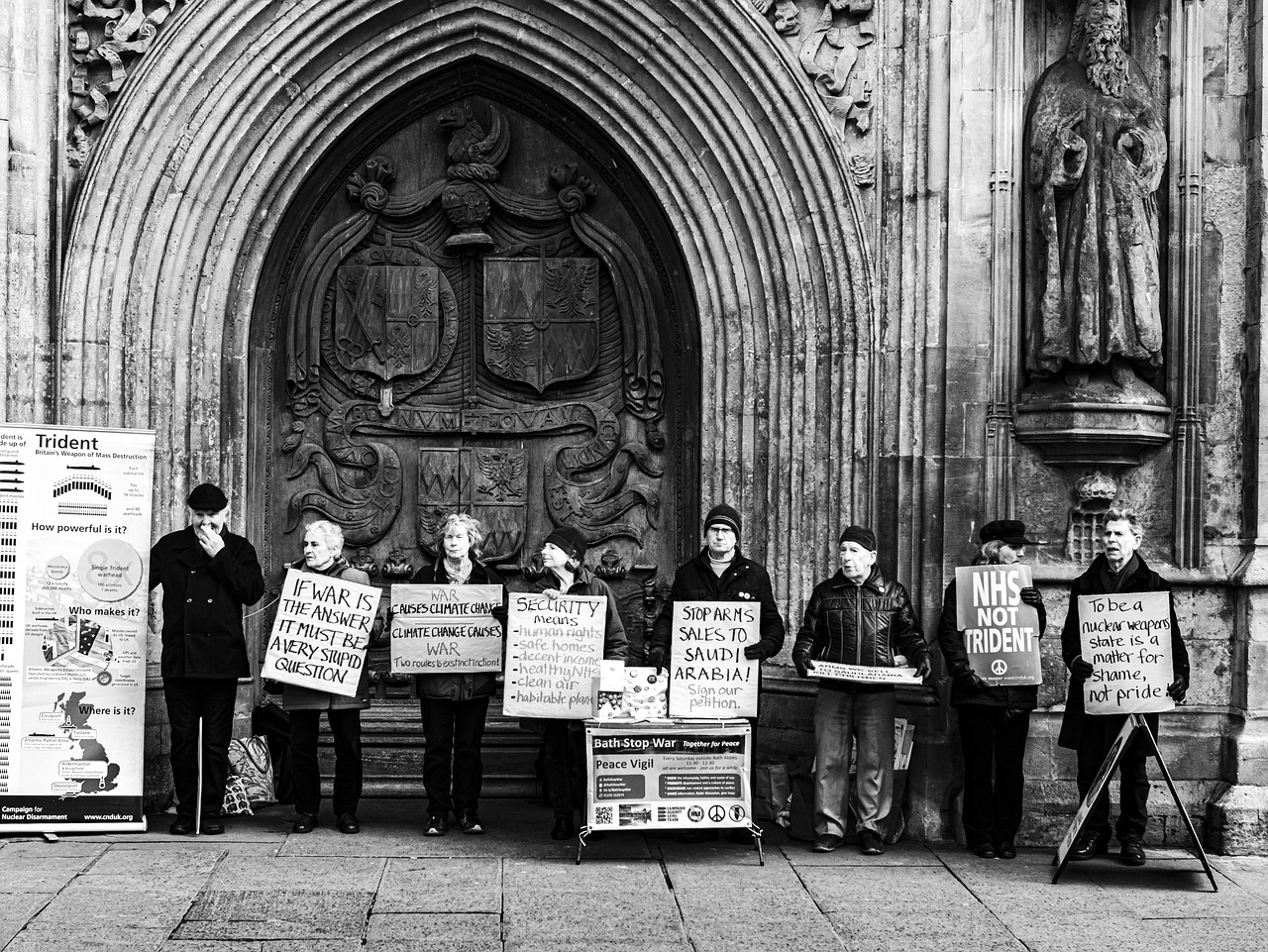
Challenges to Philosophical Ideals
Philosophical ideals often stand as the backbone of political thought, representing the aspirations of societies for justice, equality, and ethical governance. However, the journey of these ideals through the political landscape is fraught with challenges. One of the most significant obstacles arises from the overwhelming influence of wealth in politics. Wealthy individuals and corporations wield considerable power, often prioritizing financial gain over ethical considerations. This can lead to a scenario where philosophical ideals are sidelined, overshadowed by the interests of a few. For instance, when financial contributions to political campaigns come with strings attached, the original philosophical tenets that guide governance can become distorted or entirely neglected.
Moreover, the **complexities of lobbying** further complicate the landscape. Lobbying groups, often funded by affluent donors, push for policies that align with their interests, which may not necessarily reflect the broader philosophical values of the society. This creates a tension between the collective good, as envisioned by philosophical thought, and the narrow interests of the wealthy. As a result, philosophical discussions about equity and justice can be drowned out in the cacophony of financial lobbying.
Another challenge is the **growing wealth inequality** in many societies. When a small percentage of the population controls a significant portion of wealth, their voices tend to dominate the political discourse. This disparity can lead to a political environment where the wealthy have greater access to decision-makers, effectively marginalizing the perspectives of the less affluent. As philosophical ideals often advocate for the rights and representation of all individuals, this unequal influence can undermine the very essence of democratic governance.
Additionally, the rapid advancement of technology and social media has transformed the political landscape, presenting both opportunities and challenges for philosophical ideals. While these platforms can amplify voices advocating for justice and ethical governance, they can also be manipulated by those with wealth to spread misinformation or promote divisive narratives. This manipulation can distort public perception and shift the focus away from philosophical discussions toward sensationalism, further eroding the foundation of informed political debate.
In summary, the challenges to philosophical ideals in politics are multifaceted. From the overpowering influence of wealth and lobbying to the implications of wealth inequality and the dynamics of modern communication, these factors combine to create an environment where philosophical discourse struggles to find its footing. It is crucial for advocates of philosophical ideals to recognize these challenges and seek innovative ways to ensure that ethical considerations remain at the forefront of political decision-making.
- What role does wealth play in shaping political decisions?
Wealth allows individuals and corporations to exert significant influence over political processes, often overshadowing philosophical considerations. - How do philosophical ideals impact governance?
Philosophical ideals provide frameworks for justice and authority, influencing policies and the understanding of rights within political systems. - Can philosophical ideals coexist with wealth-driven interests?
While they can coexist, the influence of wealth often challenges the implementation of philosophical ideals, leading to potential conflicts in governance. - What are some examples of philosophical movements influencing politics?
Movements such as civil rights and environmentalism have historically drawn on philosophical ideals to advocate for significant political reforms.
Frequently Asked Questions
- How does philosophy influence political systems?
Philosophy provides the foundational principles that shape political ideologies. It influences how leaders and citizens perceive justice, authority, and governance. For example, philosophical movements like liberalism and socialism have significantly impacted policies on individual rights and social justice, guiding the direction of political systems.
- Can wealth overshadow philosophical ideals in politics?
Absolutely! Wealth often acts as a powerful tool in politics, enabling wealthy individuals and corporations to exert considerable influence over political decisions and campaigns. This financial power can sometimes overshadow the ethical and philosophical discussions that should guide governance, leading to a focus on financial gain over public good.
- What historical examples illustrate the tension between wealth and philosophy?
Throughout history, there have been numerous instances where financial resources have determined political outcomes. For example, during the Gilded Age in the United States, wealthy industrialists had significant sway over political processes, often prioritizing their interests over philosophical ideals of equality and justice.
- How does campaign financing affect democracy?
Campaign financing is crucial in modern politics, as it often dictates which candidates can compete effectively. Wealthy donors and corporations can shape electoral outcomes, raising concerns about the integrity of democratic processes and the potential marginalization of philosophical discourse surrounding governance.
- What impact does wealth inequality have on political representation?
Wealth inequality can lead to unequal political representation, where the voices of the affluent overshadow those of lower-income individuals. This disparity affects policy priorities and voter influence, often sidelining philosophical arguments for equity and justice in favor of the interests of the wealthy.
- Can philosophical beliefs moderate the effects of wealth in politics?
Yes, philosophical beliefs can play a crucial role in moderating the influence of wealth in political contexts. When grounded in ethical considerations, these beliefs can foster a more equitable approach to governance, encouraging policies that prioritize the common good over individual financial interests.
- What challenges do philosophical ideals face in political arenas?
Philosophical ideals often encounter significant challenges from wealth-driven interests. Issues like lobbying, corruption, and the prioritization of financial gain can undermine ethical considerations, making it difficult for philosophical perspectives to gain traction in political decision-making.

